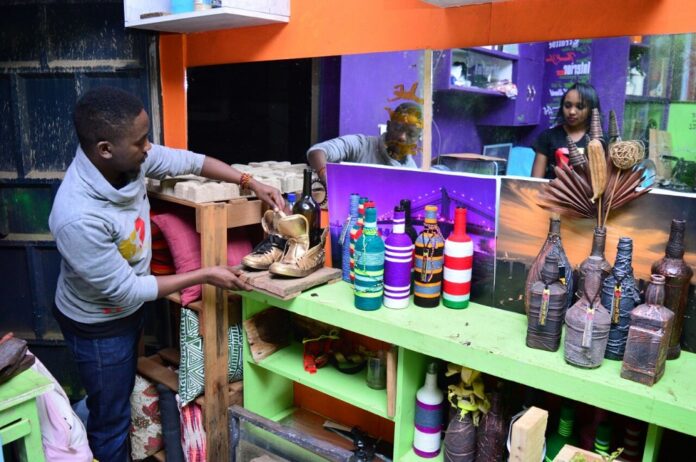Walking around every estate and town centre in Kenya, you won’t miss two or three bottles lying idle. But how many would imagine such bottles could fetch them millions?
This is the venture that made David Chege, a Kenyan interior designer a millionaire at 30. The businessman, who holds a Diploma in Interior Design from Buruburu Institute of Fine Arts, says he started his business as a hobby.
According to him, he would recycle waste bottles, decorate them, and place them in his house as decorations.
He would then take photos and post them on his social media accounts for his friends to see. Surprisingly, friends started inquiring whether he was selling them.
Pushed to the limit, he decided to give it a try, and in his first sale, he pocketed Ksh2,500. He had zero capital input, only creativity and passion.
At the time, he was working as a graphic designer at Maasai Mara. Having seen potential in his craft, Chege decided to quit employment to fully focus on the bottle business, operating under the brand name ‘House of David’.
How ex-banker made millions from stealing Sh1 daily from clients’ accounts
The decision was fully supported by his family and friends, something that encouraged him to give his work his best.
His biggest breakthrough was when he received Sh1.5 million from a sponsor who was impressed by his work. He partially used the funds to acquire the necessary machinery for his work.
Chege further expanded his business from just house decorations to lampshades, cushions, wood products, centre pieces for events, and anything customisable from the waste materials he collected.
The business peaked quickly, and at one point, he received an order worth Ksh90,000 of furniture assortments before climbing ranks to start making over Sh100,000 Monthly.
House of David, Headquartered in Kahawa Wendani, still serves only Nairobi and its environs. However, plans are underway to expand it to other major cities in Kenya, employ more youths and on top of it all mentor them to start their own ventures.
They also intend to start a showroom for their products since their current workshop doubles as the showroom; hence, when clients visit, sometimes operations have to stop.
Among the challenges he has encountered include competition from some of his customers who purchase his products, copy his works, and then resell them at a cheaper price.
He also points out the availability of the market as another big challenge facing local artisans.
“Most Kenyans do not appreciate locally made artwork, especially from recycled materials. You cannot sell such works in supermarkets and the ‘official’ markets. The products are in their own class, hence you have to create the demand in order to market them,” he says.
He advises aspiring entrepreneurs to follow their passion and build a sound plan for what they want to achieve.
“People go wrong because they do not plan. Lack of planning is the first killer of businesses. There are many stagnant businesses, because they do not have plans,” he says.









